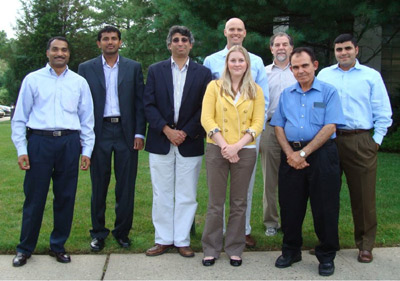Liquid Light, the Monmouth, New Jersey-based startup, spun out of a Princeton University lab in 2009, has developed a breakthrough waste-to-value technology that converts CO2 (including from its source) and uses low-energy catalytic electrochemistry to turn it into value-added industrial chemicals.
It received notoriety last month, winning this year’s Global Cleantech 100 list Rising Star of the Year award, selected by 84 corporate strategic and venture capital investor judges.
Liquid Light’s technology will likely appeal to large corporations seeking new technologies to help them convert their waste streams into high-value products, and lower their carbon footprint, particularly in the oil & gas industry. The Global Cleantech 100 list report quoted one of its corporate investor judges as saying the company is “strongly positioned to become the first CO2-to-chemicals technology” and “is very likely to be a long-term winner.”
The company told CleanTechIQ that they’re currently in discussions with several corporations about licensing their technology, using chemicals produced by their technology, gaining early, advantaged rights to specific parts of the technology, and investing in the company.
Liquid Light closed on a $15 million Series B financing round on Sept. 11, which included existing investors VantagePoint Capital, BP Ventures, Chrysalix Energy Venture Capital, and Osage University Partners and new investor Sustainable Conversion Ventures, which focuses on renewable fuels and chemicals investments. According to the company, the new round will fund the next stage of their business plan, but they are still open to speaking with other qualified investors.
It previously raised $8.5 million in Series A funds in Dec., 2011 from investors including Osage Univeristy Partners, VantagePoint Capital, Redpoint Ventures, Chrysalix and BP Alternative Energy.
The company, which came out of stealth mode in March, is backed by more than 100 patents and applications, and extends to multiple chemicals with large existing markets, including ethylene glycol, propylene, isopropanol, methyl-methacrylate and acetic acid. The company has already shown they can convert carbon dioxide into isopropanol, acetone, and more than 30 other chemicals, and has demonstrated that its process is cost-efficient.
As its first product, it is focusing on producing ethylene glycol (MEG), used to make plastic bottles, antifreeze and polyester clothing. Ethylene glycol is estimated to be a $27 billion annual market.
Its technology reduces the amount of energy needed for the conversion process and lowers the cost to make high-value chemicals by using cheap CO2 waste rather than costly corn or oil that is used currently.
The company is using the new funds to develop a pilot plant to hone the technology and process and scale up the conversion process to a tons-per-day plant. Company managers told CleanTechIQ that they expect their first commercial shipments and use of chemicals to be made with their process in 2017, and are currently in a range of licensing and partnering discussions.
In addition to winning the Global Cleantech 100 award, it has racked up other awards this year as well, winning a Climate Change and Emission Management Corporation (CCEMC) $500K Grand Challenge Grant in April, and was named a finalist in September’s ICIS Innovation Awards. And the startup’s Chief Science Officer, Emily Cole, was named to the MIT Technology Review’s Innovators Under 35 list in 2014.

Left to right, Nety Krishna (c-founder), Narayanappa
Sivasankar (Senior Scientist), Andrew Bocarsly
(Founder), Emily Cole (Chief Science Officer, co-founder), Kyle
Teamey (CEO, co-founder), Thomas Mallouk (scientific advisory
board), Shaaban El Naggar (advisor), and Fouad El
Nagg (co-founder)